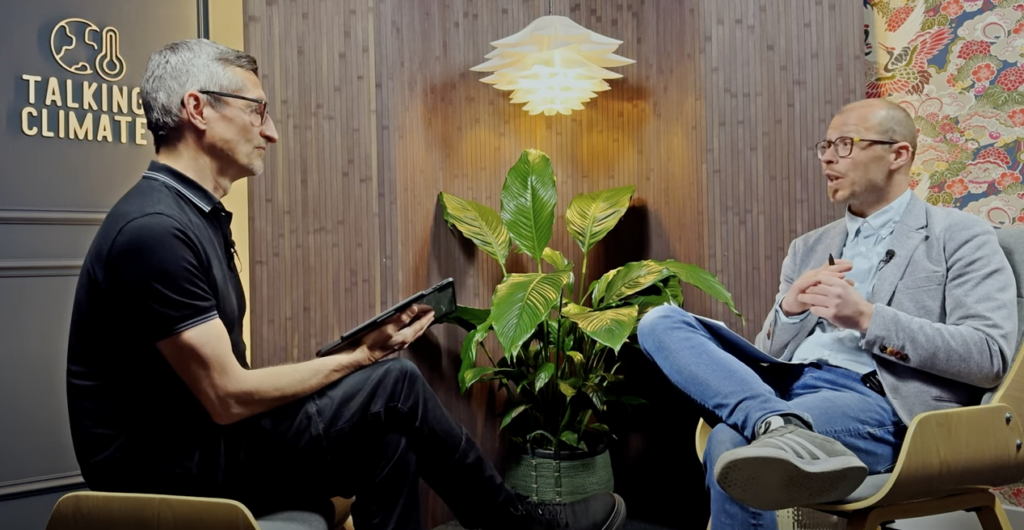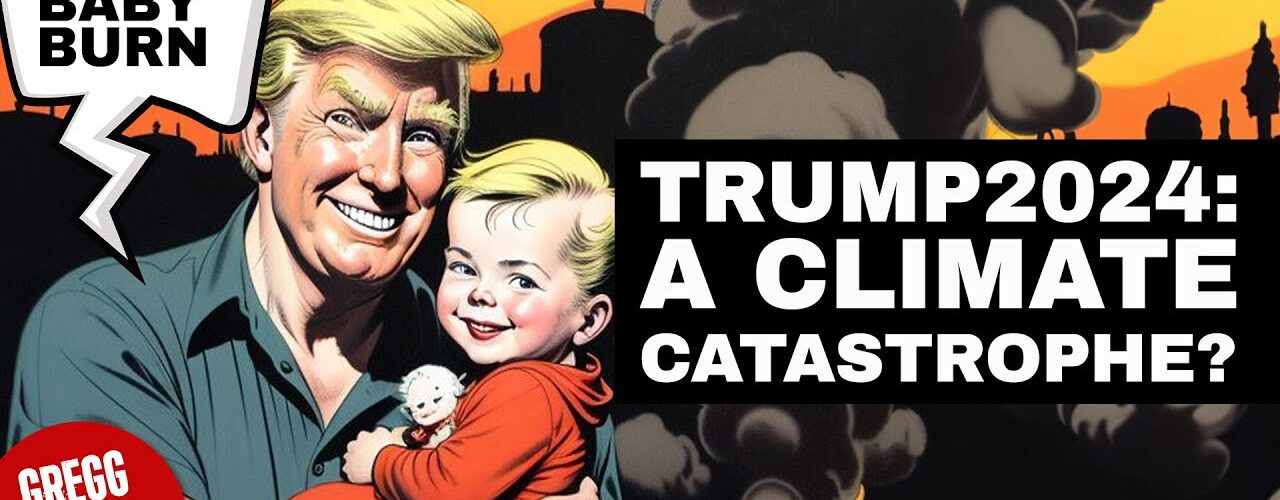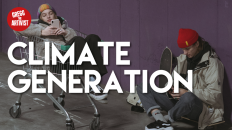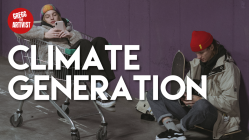Trump ’s Return: Our Climate’s Worst Nightmare
Trump 2.0: What Does a Second Trump term mean for the Environment and our Changing Climate? What Can We Learn from His Actions During His First Term?
Before we get to discussing the potential of a second Trump coming… this has been an exciting week for me. I finally finished building my home studio for my new series on Gregg The Artivist called ‘Talking Climate’.
And I’ve have been super busy lining up experts from around the world to discuss climate related topics, beyond that of the extreme weather conditions, that we should all be aware of. From national security, food security, water scarcity, power shortages and much more. I hope that the series will spark interest and awarenes. As well as being informative of impacts that we may not automatically connect as a result of our changing climate.
Moreso, I was able to film the first episode with my special guest, Dario Fazzi – an environmental history expert, Author and Professor at Leiden University and the Roosevelt Institute for American Studies in Middleburg, here in the Netherlands – he joined me to shed light on the intersection of US history, politics, and the environment to get to the bottom of what a second Trump term could look like – yet he bought so much more to the discussion. Super interesting, and I am sure with spark many questions of your own!
Please check out the video above. I hope you enjoy it. Alternatively, a transcript of the video is below.
Have a great week – Gregg 🙂
p.s. Don’t forget to leave comments! I would love to do a follow up interview with Dario responding to your comments and questions.

Transcript: Trump2024: A Climate Catastrophe?
Gregg: Is a second Trump term a climate catastrophe in the making?
From his unapologetic comments: “I don’t believe it”, “Climate change is a hoax” ,“I don’t think science knows” to “Burn, Baby Burn.” We won’t find him rolling around in the grass with a daisy, anytime soon!
Hey, I’m Gregg, and join me as I delve into climate-related topics beyond the extreme weather events with experts from around the world discussing how these issues impact us all.
And while you are here, please be sure to hit that subscribe button, to ring that bell icon for future episodes, and also give the video a thumbs up as it helps spread the word!
Our guest today, is Dario Fazzi, an environmental history expert, Author and Professor at Leiden University and the Roosevelt Institute for American Studies in Middleburg, here in the Netherlands – he joins us to shed light on the intersection of US history, politics, and the environment.
Welcome to the channel!
Dario Welcome, and thanks for joining me for the first episode of this new series Talking Climate today.
Dario: Thank you, thank you, thanks a lot for inviting me, thanks a lot for having me here, its my pleasure.
Gregg: You’re welcome.
Let’s jump straight into it, you know it’s an incredibly interesting time for US politics, and as Trump builds momentum for a second term in the Oval Office, you know what does his first term tell us about his potential intentions for environmental and climate polices?
Dario: Well OK, well this is a very interesting topic and timely questions to address.

What Does Trump Represent?
In order to reply to this question we need to understand not only what Trump did but the kind of things that Trump represents.
What concerns the overall relationship between the United States, modern contemporary America and the environment.
Now to reply to your questions what did Trump do in his first term in office, what concerns the environment, you know an overall assessment can not be positive.
He actively dismantled many of the provisions, many of the legislation that was supposed to minimalist or at least trying to reduce the overall impact the United States as a country, as a machinery, as a people, as a nation in general has been having on the global environment. According to some estimates Trump’s administration made roughly 100 pieces of legislation about the environment, and environmental protection ineffective. And this ranged from you know, regulations that take care of water quality, to the quality of the air, to issuing permits for drilling or for mining more fossil fuels like coal.
Trump’s actions, Trump’s scandals, Trump’s political inefficiencies for all concerns the environmental legislation has had an impact. On the American environment but more broadly on the planetary systems.
The United States when back to producing a lot of greenhouse gases, CO2 levels have been spiking again. The withdrawal from the Paris Agreement which is perhaps the most important and also the best known anti environmentalist action that has been put forward by Trump’s administration has contributed to warming up the planet a little bit more.
So then we can not be optimistic if a candidate like that, that has this kind of record for all concerns his environmental legislation and approaches to the environment will go back to the White House we can not expect anything but continuity. Also considering the kind of emphasis he is placing on traditional ways of producing energy in the United States that is related to fossil fuels or natural gas.
Having said so, having highlighted the kind of negative impact that Trump has had on the environment and that we can expect him have in a second term on the environment, the issue is a little bit more complex.
Overall Impact of the U.S. on Our Climate
Again we should take into consideration the overall impact that the United States has been having on the environment and are very lightly to continue having on the environment whoever is going to be the next president.
There are some structural issues to be taken consideration there, and then there are possible avenues that are depending on who is going to be the President the country will take and we can talk about this during our conversation.
Gregg: You know you mention a candidate like Trump, with his approach to the environment in his first term, you know we can’t really be that optimistic. We did see that his actions did increased CO2 emissions in the US. Which is an interesting point to raise because, people don’t realise that historically the US is the biggest emitter of Co2 gas emissions, and thats only been surpassed by on an annual basis by China in recent years. And these emissions of course are not only bad for the US but they also have and hurt our global emission targets. That said, what specific policies might Trump try to prioritise in a second term?
Dario: Ok well this is interesting especially due to the ways in which you introduced this question. It is true that the United States has been historically, I don’t know if everybody knows about this, but it is historically one of the main, the most important contributors greenhouse emissions in this planet.
Now scholars defined the period from 1945 onward as a very important stage of these Anthropocene era, or this era which human impact has been completely reshuffling the geo bio chemical cycles that put the Earth together. This particular stage from 1945, lets say onward, has been defined as the great acceleration. A period in time which all the indicators, all the markers of the Anthropocene era, have been going up at an unprecedented rate, at an unprecedented pace and speed. And most of this acceleration is related to the ways in which the United States has been driving this latest modernisation.

America’s Industrial Capitalism
One of the main factors in this is, for instance America’s Industrial Capitalism. The application of industrialisation across the board. From mechanised agricultural to mass production and consumption. This has had a huge impact on the global systems. Think about the use of fertilisers for instance, or the overwhelming presence and influence of the petrol chemical industry and byproducts. These have had an impact on our world, on our planet.
And there’s more than that, just like the surface, the materiality of it. There is also the ideological approach to the environment. Because this kind ion model of development has been mostly technologically driven. The United States has been putting a lot of confidence and trust in technological innovation. Preferring the technological principle over other principles like the principle of procuration for instance. The idea that first you need to test the technology to see whether or not if it has an impact on the environment before applying it. Well the United States has been following another idea off progress and development thats been largely successfully applied all over the world. Successfully of courses from a capitalistic point of view. But from the point of view of the environment, we are now seeing what are the costs and consequences of this. Include, you know add to this, the overwhelming influence of military industrial complexes and apparatuses that have a huge impact again on the geo bio chemical cycle of the Earth. You also need to understand that the attitude towards the environment that the United States is embedded within, is an attitude that its largely exploitative. It has always been like that. The nation has been constructed, built upon this idea of unbounded, unlimited national resources that were at the disposal of settles back then, 250 years ago and people who are living in the United States now. It’s the idea of the frontier, of constantly, disposal frontiers that have been available for the United States.
Gregg: Which is actually an interesting point, if we look at central/north US with agriculture and farming, which is now just dust bowls which its impossible to actually grow anything, and the way that impacts there weather there and the livelihoods of the people in this areas.
Dario: Yeah, there has been again, a constant attitude as utilitarian, the idea that the environment and natural resources are there for the exploitation of political or societal systems.
And this has had in the United States also a very interesting translation into actual societal relations in phenomena that have been largely connected to environmental justice issues. So this uneven social/ecology development, the degradation off the natural environment the United States its built upon has not be even. You know it’s been exposing some communities more than others. And usually this communities are always the communities of colour, communicates characterised as the poorest people or the most marginalised groups. So, all of this is structural in the United States. In order to change this really, you need a complete subversion of cultural/political mindset – something that goes beyond the previous president or the next one. But within this structure there is now a certain kind of novelty, an element of novelty that is represented by the awareness of the threat, of the actual moment of the urgency about of the crisis we live in. Numbers and science and studies are telling us that we are reaching and perhaps have been already overcoming some of the most important tipping points. For what we call climate threats right?!
Gregg: Seven of them last year.
Dario: Exactly. Now that is exactly the point, the moment in which the democrats and republicans start diverging, and do not agree anymore. The idea of the Anthropocene – are we really as human beings modifying the ways in which the planet works? Well the democrats may tend to reply positively to this question and yes, perhaps we need to do something to mitigate our impact. Perhaps to reserve course of our actions.

Trump Base Denial
Republicans denied this exists. Especially the book of the Trump base is completely against the idea that any such a thing such as Anthropogenic transformation or climate change exists. We have been developing in this way and we will continue to develop our world, our societies in this way. So “Drill, Baby Drill”… fine or let’s keep using coal because coal is clean, because coal has been always allowing us to develop this way. That’s the moment, the point in which the two start not to communicate anymore. And there is where you can expect some political differences, but also differences in terms of policies.
And going back to your question which kind of policies can we expect from Trump’s administration are all the policies that are consequential to this mindset. So you know you won’t have any kind move, you can’t expect any kind of move that can make sure the United States impact less on the environment. Then it would actually be again a new 2016 where the United States will keep investing, especially in fossil fuels. Also because of the continuance, because off the particular moment of crisis we are living now. But again this is perhaps a matter for the continuation of our conversation.
Gregg: So you raised a few interesting things there; how the US driving this latest modernism such as industrial capitalism and the impact that his technological driven model has had been successfully implemented across the world. You also mentioned about the exploitative national attitude of the US and its impact of marginalised groups. And the need for a complete subversion of the culture and political mindset to quote your words. But with these two camps of opinions forming in the US, from those who understand what is going on with the environment and want to make changes, to those whom are on the Trump lets just you know, business as usual. What challenges might Trump face in implementing his non- environmental friendly policies?
Dario: Well there are, there will be challenges and opportunities on both cases whether or not Trump gets elected or whether its Biden who get elected, the new president will be facing a series of political, strategic global challenges that will determine also to a large extent their own approach to environmental issues. There are some variables, in other words on which the new environmental policy of the United States will depend on whoever is going to be the President not only Trump. One, preps the most evident, the most, the clearest of this variables is represented by war and instability at an international level. For many reasons I would like to highlight perhaps two of them. War is not neutral in environmental terms. And especially if the United States will keep acting as the arsenal of democracy right, in producing war instruments and invest in an ever expanding arsenal that might be used in Ukraine, or another scenario to define NATO, or to define Europe from Russia’s aggression. Maybe used in order to prevent some actions on the part of China, or maybe used in order to protect the allies in the Middle East. These investments will have a cost, will have an environmental cost. You know producing machinery, guns, munitions, investing.. I was talking to some friends, I’ve been to the Unites States a few weeks ago, and former officers of the Department of Energy were telling me that the United States, the production of plutonium has been resumed. Uranium mining has been resumed because after years of reductions of strategic nuclear armaments the United States are now catching up with the new national security threat. Or any least threats that are perceived as involving national security. And this means again rearmament not only conventional rearmament but also nuclear one, which is extremely dangerous and it entails a cost for the public health and the environmental health of the country to a large extend. To an extend historians are now uncovering you see all the damages that uranium mining has been creating for generations and generations to those communities where uranium was mined, has been mined. Most importantly Navaho people in the four corners area. But there are places that are like sacrifice zones, that are sacrificed in order to guarantee the expansions of American military industrial operators. There are four military investments that will surely be an important variable in any kind of projection that we do about the future impact the United States will have on the environment. And this does not really depend of the kind of President we are going to have in the White House. Its more like how the United States want to project, keep projecting its power abroad.
U.S. Gas
The other thing connected to the international instability is that, and we may tend to forget this, is that this is also related to that legacy we were mentioning; given the rising threat especially in Europe with Russia and the decline of the availability of Russian gas, we in Europe started relying and are now more and more replying on American Shey Gas which has boomed in terms of production during Obama. Being support as a business, and expansion of the business is being supported during Obama’s years, and the boom of Shey Gas in the United States supported the economic growth of the United States keeping unemployment levels very low, controlling inflation and guaranteeing a line of supply and also money, given you know the rising exports of gas to Europe. Now the gas industry is fossil fuel industry, is an industry that has a huge impact on the environment. Shey gas and fraking containment ground water, exposes communities to environmental degradation. So you know the availability of other sources of energy, investment in green energy also in other parts of the world , will determine how the United States will reply more or less to this source of energy and to this source of revenues.

These variables again will be there on the table for the future president. And now we can think that maybe Biden will try to negotiate some diplomatic agreements and will try to limit the investment in the arsenal of democracy, in the war machinery in the United States. But at the moment we don’t know how the situation will develop. We have to take this into consideration. That whoever is going to be the president these variables and other kinds of variables may play a huge role in determining how the United States will position itself in relation to the environment.
What are the constraints to these variables? So how can, what can limit Trumps action as you asked, one of the things, there are exogenous and endogenous constraints. An exogenous one be an economy crisis for instance. The exaction to reduce investment in certain particular crucial sectors. But an endogenous crisis could be the rising of awareness of civil society. That is been representing a constrain actions of the United States historically in many time, on many occasions. Civil Society. Civil Society with a well informed and public opinion can play a role in determining how the United States positions itself and the policies of the United States. This has happened since the 70’s onwards and it has happened on certain, particular occasions for particular reasons. And in particular, under particular opportunities like, for instance the monorail protocol in the 80’s that banded the use of CFC’s in order to protect the ozone layer. We may witness the rise of a boarder an boarder awareness of public opinion that eventually will effect the policies decisions of the new administration. But its an investment in the long term because in order to have an aware public opinion you really need to invest in education, on dialogue, on tools of environmental democracy which at the moment seem a little bit foreign to the political landscape in the United States.
Gregg: So it’s really clear that you know, regardless of who the next president maybe that they are going to be facing many challenges here. And I really appreciate the point you made about the US’s role and war, and that war is never neutral regarding the environment, not to mention public heath. And we have seen and know about the US military budget being increased significantly. And of course there is the growth of US gas, which is particularly interesting for us here in the Netherlands. We only know too well the consequences of fracking and it has now been banned here in just recent years. Which is kind ion really interesting given the fact that we are now importing the US gas. Which is not only an environmental nightmare in the US, but also poses many environment threats to the Netherlands and is suspected of being linked to marine biodiversity loss, or strange behaviour among the marine life in particular areas where this gas is coming in. You also bring up the potential challenge for Trump being the rising of awareness of civil society. Which you know is a great point to expand a little bit on because I find it very interesting that many people still believe that we can to do anything. Yet the examples you have given and throughout history we have really seen that through the awareness if civil society and people coming together and standing together and speaking together as one, that change really can happen.
Trump / U.S. Influence
Given all that and to wrap yup this conversation, how might Trump’s potential second term impact global climate efforts? I am referring to the fact that should he act as we may suspect his to act, what message does that really send to the rest of the world? How could his actions influence other countries climate action?
Dario: Well I may give a reply to this question that is perhaps a the reply by historians, the values of being analysing the role the United States has played in the world, in temporary global affairs. Assuming that this is more or less this is what is going to happen under Trump too. It may not be the case because historians are famously notorious for not being good at doing any kind of prediction. But if I have too you know consider a potential second Trump term within a boarder again historical development then I see that you know, any kind of positive steps you know toward the protection of the environment, lets call it this way. Which it can mean you know the implementation of domestic, sound environmental legislation or the achievement of an international, intergovernmental regulation of the environmental and environmental resources, for the safeguard of the environmental resources – in order to achieve this goal, so like boarder international consensus on certain kind of environmental issues, as it has been in the past, because this again in the past has happened a few times, you really need the United States to play a role of leadership. so to take the leads in this. We, this is the experience, this is what the experience tells us that all the most effective environmental regulations that have been implemented, activated an international level will of had the backup off the United States and you see this in negative terms too. As in all the most ineffective pieces of legislation that have been implemented at international level have not worked because the United States have stepped back from supporting it. Like for instance the Basil convention, on Trump’s boundary trade of waste, hazardous waste. Ok. So the United States is a crucial actor for any sort of intergovernmental and international environmental diplomacy or environmental regulation to happen.
If a second Trump term will mean a withdrawal from this level of engagement, and from this leadership we are going to have a problem. We are going into unchartered terrain which the leadership maybe taken by other countries, I don’t know like the European Union or a single country China or I don’t know, Middle East. Maybe former oil relying countries will start creating a cartel defending the implementation of solar power all over the world… I don’t know, I really don’t know. This is really uncharted terrain.What I know and I can know this as a historian, is that when the United States has been playing that role, the role of Scholars called the Liberal Leviathan, the provider of order and stability that has that you know, whose role also produces this kind of beneficial consequences with a lot of problems too I don’t , not denying that. Then we achieve some goals. If we are going to witness once again American isolationism or retreat, in international engagement with Trump again, then it might be more and more difficult to achieve any sort of agreement. Because there will be a natural stimulus, a natural inclination if you want, to not perform that role, band wagon on some other investment, engagements or just you know doing enough to cope with a threat and challenges that should actually be existential, and shouldn’t only reply on the whim of an elected man on the other side of the Atlantic.
Gregg: Dario thank you very much for your time.
Dario: Thank you.
Gregg: I really appreciate it, it was really insightful and informative. I hope you can join us again.
Dario: Yeah surely, Thanks a lot, and good luck with this project. Keep having fun.
Gregg: So Dario really bought a richness to filling in context to answer todays question, provoking many more questions of my own.
From the legacy from Obama’s presidency, to the US positioning of itself in the world, to it’s oil, to it’s culture, to driving industrial capitalism and the overall impact the US has and influence in the world. I’m sure it spark questions of your own. Please drop them in the comment box below. I would love to invite Dario back to do a follow up video using your questions.
Again, if you have not done so already, then please do give this video a thumbs up. Please subscribe to the channel and click on that bell for further updates.
Until next time, it’s bye from me for now!
If you liked this video, be sure to check out my video ‘Do Our Youth Really Care About The Climate Crisis?’
Click on link here to see the episode.
Follow me:
✅ Subscribe My Channel: https://www.youtube.com/greggtheartivist
✅Instagram: https://www.instagram.com/greggtheart…
✅Tick Tok: https://www.tiktok.com/@greggtheartivist









Add comment